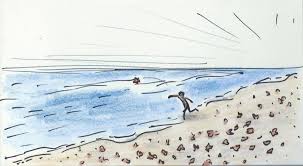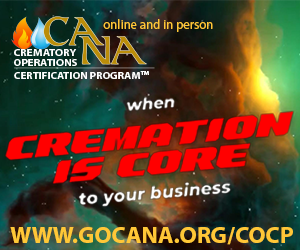Helping families, then losing their connections: Do you make a difference?
 If you have been on the front lines of funeral service for any time period you probably have some of the same thoughts that I do. When I would serve a family there was period of about 7 days from my first connection to the family after the death through a few days after the funeral where we spent a lot of time together and could not help but get to know one another pretty well.
If you have been on the front lines of funeral service for any time period you probably have some of the same thoughts that I do. When I would serve a family there was period of about 7 days from my first connection to the family after the death through a few days after the funeral where we spent a lot of time together and could not help but get to know one another pretty well.
Then, services were over, payment was made and that time together, especially if the family was from a distant city or state, you never saw them again. I very vividly remember a self-inflicted death of a young single man in my community who came from New Jersey. His emotionally devastated parents came to set-up funeral arrangements, and we worked through all of that, including burial in our community. His parents went back to New Jersey, I received a nice thank you letter from them, but I never saw them again. That was about 40 years ago and at times over the years I’ve often wondered how the parents coped and wondered about the lives they lived following the death of their son. I still do.
The same can be said of other non-funeral events in our lives. This is not a political forum, and I am not a political activist, but I’ve often wondered about some of the people of the Ukraine.
You see, in my life I owned and operated a funeral home. . . but I was an entrepreneur and I started and owned other businesses also. In about 1990 I had an inspiration, that came from going to Little League tournaments combined with the knowledge and know-how of how our high school band fund-raised trips to the Rose Bowl and Cotton Bowl came about. Much like the major college basketball tournaments of today – such as the Maui Invitational — I wondered if smaller Division 2 and Division 3 college basketball teams would be interested in going to “Destinations” for Christmas Holiday basketball tournaments.
Eventually, I founded and owned a company that “planned, promoted, and produced” college basketball tournaments in resort destinations for almost thirty years. We served hundreds of men’s and women’s teams from the USA and Canada at popular destinations in Florida, California, and Hawaii over the years. We became one of the first of this type of company and a leader in the collegiate sports travel business. The company also, by request, planned and produced summer trips for college teams to Europe for competition. I exited the business in 2012, for the most part because of increasing NCAA regulations.
It was because of these overseas trips that I was contacted by some Ukrainian/American businessmen who asked if I could set up an itinerary for a Ukrainian team to come and play in Minnesota during the late fall of 1992. You see, the Ukraine had recently received its independence and the businessmen were anxious to show Americans how Ukraine would now contribute to the free world. I was able to set up an itinerary with featured games and that’s how I came to house a Ukrainian basketball team in my Minnesota community for 10 days.

Tom Anderson
Funeral Director Daily
I have some fond memories of that group of twenty or so young men of about 20 years of age from Donetsk in the Ukraine. Only a couple of the group could speak English, but we were made aware of how proud they were to be people of their own young country, now having their own destiny — you see Ukraine had only gained its independence from the Soviet Union in 1991. The team played 4 or 5 Minnesota Junior College or Division 3 teams and had brought the country’s new flag as well as a recorded version of their new national anthem to be played prior to each game. I remember them standing at attention, so proud, every time that the flag was displayed and the anthem played.
I have many memories of those young Ukrainians. I remember picking them up at the Minneapolis airport after they had had about a 48-hour trip from Donetsk. Many of them did not have suitcases — only cardboard boxes tied with string with their clothing changes. I remember bringing them to a grocery store in my hometown and they could not believe we could just pick food off a shelve. . . they told me of their mothers’ waiting in line just to get fresh bread.
We helped supply them with some cash and brought them to the Mall of America and to a Minnesota Timberwolves NBA game where Latvian Gunders Vetra was a member of the NBA team. It was arranged so that the young men had an audience with Vetra where he spoke to them in Russian about his life as an NBA player and they were allowed to go in an NBA locker room.
At the end of the ten-day tour the owner of the bus company that we had hired for transportation had all of them to his house for a “Going-Away” feast. It was a wonderful night of friendship with our new “democratic” friends. I remember their dreams and their talk of Ukraine becoming the “next U.S.-like” democracy. The young men had now seen democracy in America in person and were sure that in time Ukraine would be just like what they saw and experienced in America – they were excited for the children they hoped to have because the future was so bright. The next day they were gone and I’ve never seen or heard from them again.
Much like that family that you serve at the funeral home that is there. . and then gone, so were the “Boys of Donetsk”. I think of them often. I thought of them during the President Trump/Ukraine Embassy situations and wondered if any of them had “high” government positions. And, I’ve surely thought of them since the happenings of last week. The “boys” I knew would be right at about 50 years of age today and I have not seen or heard from them in 30 years. . . . .I wonder, is it their children on the front lines guarding Ukraine? What hardships are they going through today?
As a human being I leave much to be desired. I’m a sinner saved by God’s grace. But, I do truly wonder why bad things happen to good people — like the self-inflicted death of the young man from New Jersey or the decimated dreamed about futures of the young men from Donetsk.
I apologize for pouring this out on you today. . . but I truly have a heavy-heart. And, I know that you, or I, cannot by ourselves save all of the heartaches that others have. However, I am reminded of the story of the old man and the boy on the beach and how we can each do our share to help the world be a better place. Here’s that story:
“An old man was doing his daily walk along the beach one morning, when he spotted a young boy crouched by the water, scooping something up from the sand and throwing it into the sea.
The beach was normally empty at this time of day, and so the old man stopped to watch for a while.
He noticed that the boy kept on shuffling a little further down the beach, then repeating this same action again and again – stopping, scooping, throwing, moving.
“What are you doing there, boy?” the old man asked, walking closer.
“I’m saving these starfish that are stranded” replied the boy, “if they stay on the beach they will dry out and die, so I’m putting them back into the ocean so they can live.”
The old man was silent for a few seconds.
“Young man” he said, “on this stretch of beach alone, there must be more than one hundred stranded starfish. Around the next corner, there must be at least one thousand more. This goes on for miles and miles and miles – I’ve done this walk every day for 10 years, and it’s always the same. There must be millions of stranded starfish! I hate to say it, but you’ll never make a difference.”
The boy replied “well I just made a difference for that one”, and continued with his work.”
More news from the world of Death Care:
- Erie funeral homes handle Covid-19 pandemic twists and turns. MSN
- Pre-Arranging your funeral takes the burden off your family. Florida Today (FL)
Enter your e-mail below to join the 2,595 others who receive Funeral Director Daily articles daily:
</div




















